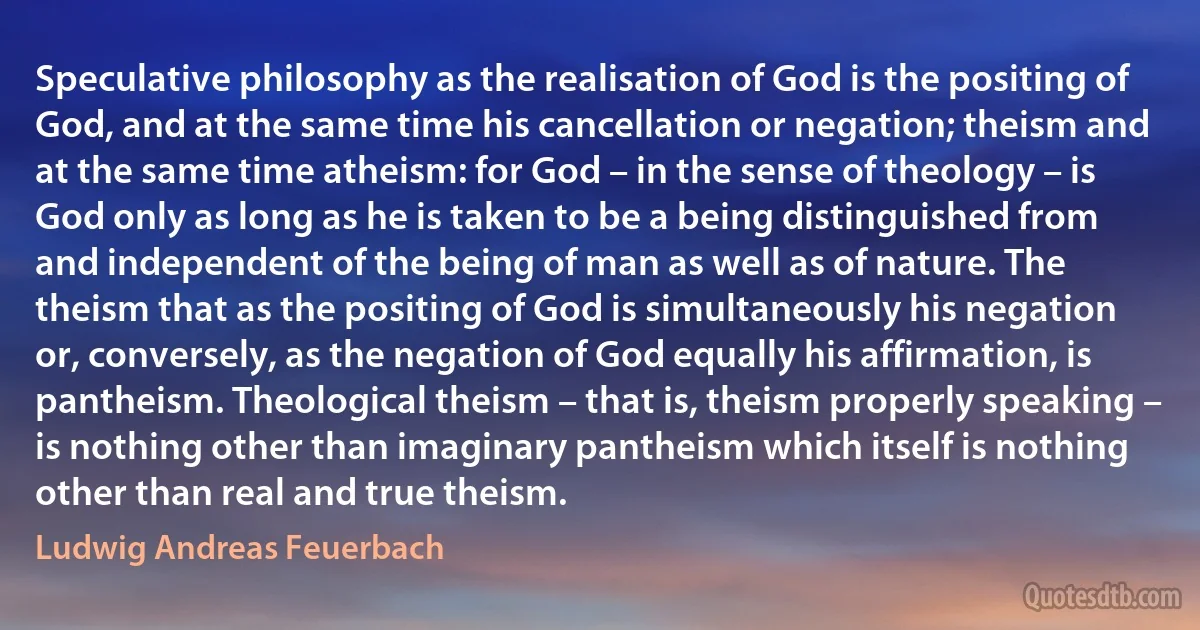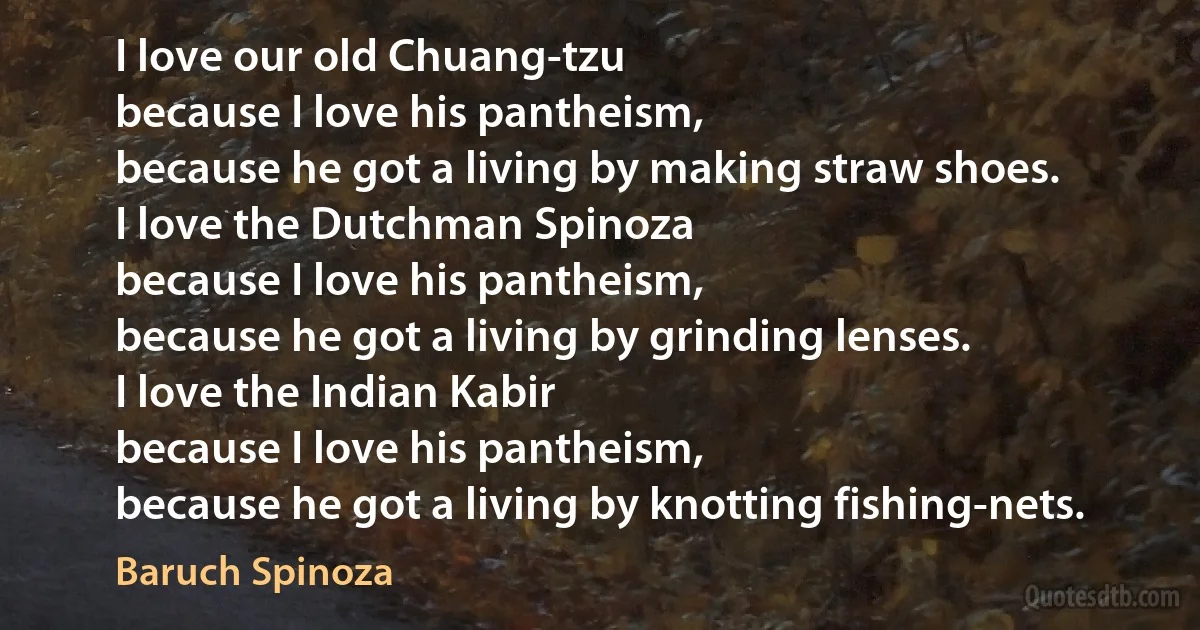Pantheism Quotes
And if the immortality of the soul had been unable to find vindication in rational empiricism, neither is it satisfied with pantheism. To say that everything is God, and that when we die, we return to God, or more accurately, continue in Him, avails our longing nothing; for if this indeed be so, then we were in God before we were born, and if we die we return to where we were before being born, then the human soul, the individual consciousness, is perishable. And since we know very well that God, the personal and conscious God of Christian monotheism, is simply the provider, and above all the guarantor, of our immortality, pantheism is said, and rightly said to be merely atheism disguised; and in my opinion, undisguised.

Miguel de Unamuno
This education startled even a man who had dabbled in fifty educations all over the world; for, if he were obliged to insist on a Universe, he seemed driven to the Church. Modern science guaranteed no unity. The student seemed to feel himself, like all his predecessors, caught, trapped, meshed in this eternal drag-net of religion.
In practice the student escapes this dilemma in two ways: the first is that of ignoring it, as one escapes most dilemmas; the second is that the Church rejects pantheism as worse than atheism, and will have nothing to do with the pantheist at any price.

Henry Adams
The Church alone had constantly protested that anarchy was not order, that Satan was not God, that pantheism was worse than atheism, and that Unity could not be proved as a contradiction. Karl Pearson seemed to agree with the Church, but everyone else, including Newton, Darwin and Clerk-Maxwell, had sailed gaily into the supersensual.

Henry Adams
There is thus all the more reason to exercise extreme vigilance ... against anything that may lead the being to become "fused," or preferably and more accurately "confused" or even "dissolved," in a sort of "cosmic consciousness" that shuts out all "transcendence" and so also shuts out all effective spirituality. This is the ultimate consequence of all the anti-metaphysical errors known more especially in their philosophical aspect by such names as "pantheism," "immanentism," and "naturalism."

René Guénon
Pantheism makes God into a present, real, and material being; empiricism – to which rationalism also belongs – makes God into an absent, remote, unreal, and negative being. Empiricism does not deny God existence, but denies him all positive determinations, because their content is supposed to be only finite and empirical; the infinite cannot, therefore, be an object for man. But the more determinations I deny to a being, the more do I cut it of[ from myself, and the less power and influence do I concede to it over me, the freer do I make myself of it. The more qualities I possess, the more I am for others, and the greater is the extent of my influence and effects. And the more one is, the more one is known to others. Hence, each negation of an attribute of God is a partial atheism, a sphere of godlessness.

Ludwig Andreas Feuerbach
Christianity, if it is to triumph over pantheism, must absorb it. To our pusillanimous eyes Jesus would have borne the marks of a hateful pantheism, for he confirmed the Biblical phrase "ye are gods," and so would St. Paul, who tells us that we are of "the race of God." Our century wants a new theology - that is to say, a more profound explanation of the nature of Christ and of the light which it flashes upon heaven and upon humanity.

Henri-Frédéric Amiel
While a case can be made for intelligent design, I can't figure out why some Christians are so thrilled about that possibility. First of all, it doesn't prove there's a God. If anything, intelligent design lends support to some form of pantheism that defines God as immanent within nature.

Tony Campolo
Ram Swarup relates how the British had been disappointed with the conclusions of the first scholar who investigated and translated Sikh Scriptures, the German Indologist and missionary Dr. E. Trumpp, who had found Guru Nanak a 'thorough Hindu' and his religion ‘a Pantheism derived directly from Hindu sources'....So, according to Ram Swarup, other scholars were put to work to rewrite Sikh history in the sense desired by the British: ‘Max Arthur Macauliffe, a highly placed British administrator (...) told the Sikhs that Hinduism was like a 'boa constrictor of the Indian forest' which 'winds its opponent and finally causes it to disappear in its capacious interior'. The Sikhs 'may go that way', he warned. He was pained to see that the Sikhs regarded themselves as Hindus which was 'in direct opposition to the teachings of the Gurus'. Ch. 8.

Koenraad Elst
To express myself briefly, Goethe was the Spinoza of poetry. The whole of Goethe's poetry is filled with the same spirit that is wafted toward us from the writings of Spinoza. There is no doubt whatsoever that Goethe paid undivided allegiance to Spinoza's doctrine. At any rate, he occupied himself with it throughout his entire life; in the first part of his memoirs as well as in the last volume, recently published, he frankly acknowledged this. I don't remember now where I read that Herder once exploded peevishly at the constant preoccupation with Spinoza, "If Goethe would only for once pick up some other Latin book than Spinoza!" But this applies not only to Goethe; quite a number of his friends, who later became more or less well-known as poets, paid homage to pantheism in their youth, and this doctrine flourished actively in German art before it attained supremacy among us as a philosophic theory.

Baruch Spinoza
There is no place in Spinoza's system for a sense of mystery in the face of nature. Such an attitude is to be dispelled by the intelligibility of things. Religious wonder is bred by ignorance, he believes. Spinoza contrasts the person who "is eager, like an educated man, to understand natural things" with the person who "wonders at them, like a fool". For Spinoza, anyone who would approach nature with the kind of worshipful awe usually demanded by the religious attitude represents the latter. By definition, and in substance, pantheism is not atheism. And Spinoza is an atheist.

Baruch Spinoza
Pantheism, when explained to mean the absorption of the infinite in the finite, of God in nature, is atheism; and the doctrine of Spinoza has been so regarded by many. When explained to mean the absorption of nature in God, of the finite in the infinite, it amounts to an exaggeration of atheism.

William Fleming
The philosopher John Toland, in the early 18th century, insisted that the terms 'Spinozism' and 'pantheism' are synonymous. Toland says that "Moses was, to be sure, a Pantheist, or, if you please, in more current terms, a Spinosist", while Spinoza's pantheism was taken for granted by Moses Mendelssohn, Gotthold Lessing and Friedrich Jacobi, in their famous Pantheismusstreit of 1785. More recently, this interpretation also appears in both the scholarly literature and popular representations of Spinoza's thought. In the recently published Cambridge Dictionary of Philosophy we read that "Spinoza is the most distinguished pantheist in Western philosophy". But the problem with calling Spinoza a 'pantheist' is that pantheism is still a kind of theism.

Baruch Spinoza



